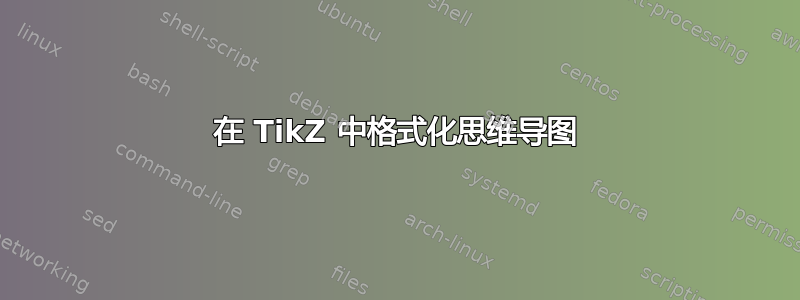
我想知道是否有人可以帮助我格式化下面给出的思维导图,以便所有内容统一,并根据节点中的子节点数量设置角度?此外,我尝试缩放 Ti钾Z 图片但仍然未能将其全部纳入边缘内。
\documentclass{article}
\usepackage{tikz}
\usetikzlibrary{mindmap}
\tikzset{level 1/.append style={sibling angle=50,level distance = 135mm}}
\tikzset{level 2/.append style={sibling angle=20,level distance = 25mm}}
\tikzset{every node/.append style={scale=0.5}}
\begin{document}
\pagestyle{empty}
\begin{tikzpicture}[ mindmap, every node/.style=concept, concept color=teal!40,grow cyclic,]
\node[concept] {Malnutrition}
child [concept color=purple!40]{ node {Health Facility}
child { node {Inadequate ANC Care} }
child { node {Long Distance of Health Care Facility} }
child { node {Insufficient Health Service} }
child { node {Incomplete Immunization} }
}
child [concept color=pink!40]{ node {Morbidity}
child { node {Intestinal Diseases} }
child { node {Congenital Anomalies} }
}
child [concept color=green!40]{ node {Maternal Health}
child { node {Maternal malnutrition} }
child { node {Higher Birth order} }
child { node {Short birth interval} }
child { node {Adolescent mother} }
}
child [concept color=red!40]{ node {Cultural Factors}
child { node {Adverse cultural practice} }
child { node {Traditional beliefs} }
child { node {Early marriage} }
child { node {Inadequate child care} }
child { node {Feeding practices} }
}
child [concept color=blue!40]{ node {Socio-demographic Factors}
child { node {Caste (ST/SC)} }
child { node {Illiteracy} }
child { node {Lack of Awareness about Nutrition} }
child { node {Occupation} }
child { node {Low Socio-Economic Status} }
child { node {Inadequate access to food} }
}
child [concept color=yellow!40]{ node {Biological Factors}[clockwise from=45, level distance=8cm]
child { node {Female} }
child { node {Low Birth Weight} }
child { node {Age of the Child} }
}
child [concept color=violet!40]{ node {Environmental Factors}
child { node {Poor Unsafe Drinking Water} }
child { node {Poor Personal Hygiene} }
child { node {Poor Sanitation} }
child { node {Open Field Defecation} }
};
\end{tikzpicture}
\end{document}

答案1
不幸的是,绘制思维导图似乎很麻烦。我喜欢结果。但它们似乎需要很多手动调整,如果你改变任何东西,你就必须重新编码一半的地图。如果forest只能绘制循环树...!
您可以缩放图片,如评论中所述。我倾向于“作弊”,让地图超出文本主体的宽度。通常,思维导图无论如何都需要放在自己的页面上,因此只要它们适合页面的物理尺寸,我倾向于让它们稍微超出边距。
或者,例如,您可以对外部节点使用较小的字体。
无论如何,这里 - 无论它有价值 - 是我尝试手动将地图挤压到它不想去的地方......

\documentclass{article}
\usepackage{tikz}
\usetikzlibrary{mindmap}
\begin{document}
\pagestyle{empty}
{\centering
\makebox[0pt]{%
\begin{tikzpicture}
[mindmap,
grow cyclic,
every node/.style=concept,
concept color=teal!40,
level 1/.append style={sibling angle=360/7},
level 2/.append style={sibling angle=37.5},
]
\node [root concept] {Malnutrition}
child [concept color=purple!40]{
node {Health Facility}
child { node {Inadequate ANC Care} }
child { node {Long Distance of Health Care Facility} }
child { node {Insufficient Health Service} }
child { node {Incomplete Immunization} }
}
child [concept color=pink!40, rotate=-10]{
node {Morbidity}
child { node {Intestinal Diseases} }
child { node {Congenital Anomalies} }
}
child [concept color=green!40, rotate=-20]{
node {Maternal Health}
child { node {Maternal malnutrition} }
child { node {Higher Birth order} }
child { node {Short birth interval} }
child { node {Adolescent mother} }
}
child [concept color=red!40, rotate=-10]{
node {Cultural Factors}[counterclockwise from=-115]
child { node {Adverse cultural practice} }
child { node {Traditional beliefs} }
child { node {Early marriage} }
child { node {Inadequate child care} }
child { node {Feeding practices} }
}
child [concept color=blue!40, rotate=-7.5]{
node {Socio-demographic Factors}
child { node {Caste (ST/SC)} }
child { node {Illiteracy} }
child { node {Lack of Awareness about Nutrition} }
child { node {Occupation} }
child { node {Low Socio-Economic Status} }
child { node {Inadequate access to food} }
}
child [concept color=yellow!40, rotate=-5]{
node {Biological Factors}%[clockwise from=45, level distance=8cm]
child { node {Female} }
child { node {Low Birth Weight} }
child { node {Age of the Child} }
}
child [concept color=violet!40, rotate=-5] {
node {Environmental Factors}
child { node {Poor Unsafe Drinking Water} }
child { node {Poor Personal Hygiene} }
child { node {Poor Sanitation} }
child { node {Open Field Defecation} }
};
\end{tikzpicture}}\par}
\end{document}


